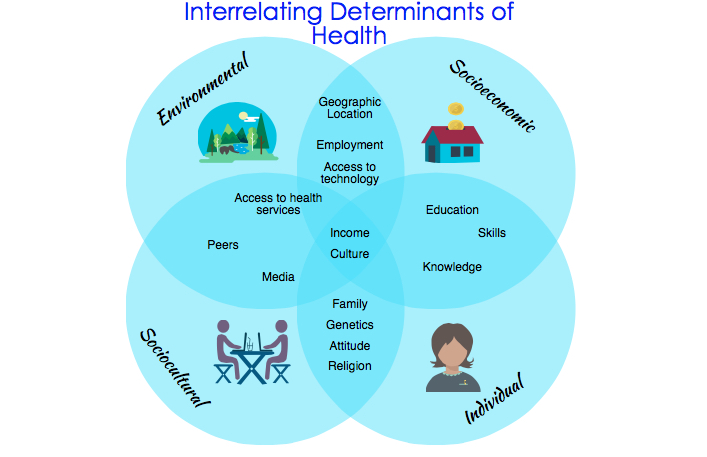In order to analyse how an individual’s health can be determined by a range of factors acting in various combinations you should first understand what each determinant of health consists of, and identify relationships within them.
For example, education is within the socioeconomic factors and this directly affects the individual factors, such as knowledge and skill. So someone with a Masters in Health Science will have great health related knowledge and skills compared to someone who dropped out of school in year 10.
Furthermore, a person’s environment is greatly controlled by their employment and income. People spend many hours at work, and can only live where they can afford. So, someone who works in the city in an office job spends many hours sitting down. If their job does not pay well, they may live a long distance from their work and have long travel times, increasing their time away from family and social activities.
Conversely where you live geographically can limit your education and employment opportunities. People who live in rural or remote areas of Australia have smaller schools, less universities available to them and a limited range of employment choices. Such people, then suffer poorer health outcomes not only because of a lack of access to health services, but also a lack of access to education and employment. For example, they may finish year 12, and then work outside on the family farm increasing their likelihood of cancer and injury.
Low income can also affect your access to health services by limiting your choices. For example, a person who has a large income can afford private health care and see a dentist or physiotherapist when needed, while someone with a lower income cannot afford to these options and suffers from tooth decay or a bad knee because hey cannot afford the health care.
Sociocultural factors can also affect your education levels access to health services. Speaking a language other than English can limit your ability to succeed in education in Australia. This reduces access to university (which if not a resident or citizen must be paid for) and makes them less able to navigate or interpret the health care system. They may also require an interpreter for health care services, which may not always be provided.
The syllabus statement “analyse how an individual’s health can be determined by a range of factors acting in various combinations” asks you to consider that health is not simply controlled by the individual, but is greatly affected by the context of that individual, both socially, culturally and geographically.

